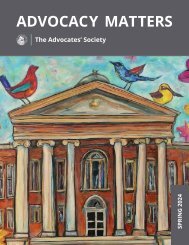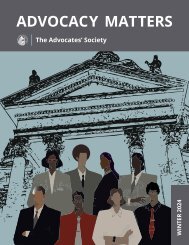Keeping-Tabs-Winter-2024
Stay up-to-date on news and events from our Young Advocates' Standing Committee (YASC) with Keeping Tabs.
Stay up-to-date on news and events from our Young Advocates' Standing Committee (YASC) with Keeping Tabs.
You also want an ePaper? Increase the reach of your titles
YUMPU automatically turns print PDFs into web optimized ePapers that Google loves.
20<br />
INTERVIEW<br />
Interview with Marianne<br />
Bastille-Parent (she/her),<br />
Stikeman Elliott LLP<br />
Aly Háji (he/him), Rickets Harris LLP<br />
Q. Could you tell me a little bit about your practice?<br />
A. My practice is a combination of domestic civil and commercial litigation as well as local and international<br />
arbitration (including proceedings ancillary to international arbitration, such as proceedings for<br />
the recognition and enforcement of arbitration clauses or arbitral awards). I represent clients from a<br />
wide range of industries, mostly in the construction, infrastructure, energy, pharmaceutical and aviation<br />
sectors. I appear before civil courts, at the provincial and federal levels, as well as arbitration tribunals.<br />
Q. Why did you decide to practice international law?<br />
A. My interest in international law sparked early and mostly began on an academic note. At the<br />
University of Ottawa, I pursued a combined degree in civil law and international development and<br />
globalization. This degree allowed me to learn about the legal, economic, geopolitical and globalizing<br />
world we live in.<br />
While in second year of law school, I participated in the Philip C. Jessup International Law Moot<br />
Court Competition. This experience was a turning point, solidifying my interest in international law<br />
and my inclination towards advocacy. The Jessup competition definitely influenced the trajectory<br />
of my career, which is why I remain fond of this competition to this day and why I acted as a Jessup<br />
coach until 2023.<br />
In my third year of university, I had the privilege of working as a research assistant for Professor<br />
Patrick Dumberry, focusing on investor-state disputes. In a way, this assistantship came with<br />
a revelation: I found investor-State disputes to be a most interesting combination of international<br />
law and more “typical” commercial litigation.<br />
This led me to enrol in the LLM program at Cambridge University in England, which I attended<br />
in 2016 as the recipient of the Paul Martin Senior Scholarship, awarded by the Canadian Institute<br />
for Advanced Legal Studies and the Commonwealth Trust. I opted to write my LLM dissertation<br />
on the intersection between investor-State disputes and aboriginal rights in countries where the<br />
economy is largely oriented towards the exploitation of natural resources.<br />
Before returning to Canada for bar school, I made a quick stop in Paris to attend the Arbitration<br />
Academy. I was very fortunate to meet and exchange with seasoned and aspiring arbitration<br />
practitioners from around the world, in the charming setting that a summer in Paris has to offer.<br />
When I returned to Montréal to begin my career, I aimed to take on every opportunity that<br />
would cross my path to make international law and arbitration part of my domestic practice. This<br />
was not just a professional choice but a reflection of my belief in the power of law to bridge borders<br />
and bring about positive change in our increasingly globalized world.<br />
Q. How did you build an international law<br />
practice in Québec, and how do you maintain<br />
a hybrid domestic/international practice?<br />
A. My practice in Montreal is primarily “local”, i.e.<br />
based on Quebec and Canadian law, but my graduate<br />
studies in international law as well as my willingness<br />
and my interest to be involved in matters<br />
raising issues of international law or questions of<br />
extraneity in Canadian law allowed me to develop,<br />
over time and in a very organic way, a practice in<br />
international law .<br />
Q. Comment avez-vous développé une pratique<br />
du droit international au Québec, et<br />
comment parvenez-vous à maintenir une<br />
pratique hybride à la fois nationale et internationale?<br />
A. Ma pratique à Montréal est principalement<br />
« locale », c’est-à-dire basée sur le droit québécois<br />
et canadien, mais mes études supérieures<br />
en droit international ainsi que ma volonté et<br />
mon intérêt d’être impliquée dans des dossiers<br />
présentant des enjeux de droit international ou<br />
des questions d’extranéité à traiter en droit canadien<br />
m’ont permis de développer, au fil du<br />
temps et de façon très organique, une pratique<br />
en droit international.<br />
Q. Comment cette pratique s’est-elle développée concrètement?<br />
A. Dans mon cas, en saisissant une opportunité à la fois. Au tout début de ma carrière, de nombreux<br />
traités de libre-échange entre le Canada et d’autres États étaient en cours de négociation<br />
et de rédaction. C’était une période de grands changements, y compris au niveau des règles entourant<br />
la résolution des différents entre investisseurs et États. J’ai eu la chance de conseiller des<br />
clients sur les impacts et ramifications de ces évolutions en cours. Il s’agissait de mandats très<br />
stimulants ! Au fil du temps, d’autres opportunités se sont présentées à moi. Plus récemment, j’ai<br />
été impliquée dans un dossier fascinant d’immunité étatique dans le contexte de procédures de<br />
reconnaissance d’une sentence arbitrale internationale. Je travaille actuellement sur un arbitrage<br />
investisseur-État.<br />
Il est important de comprendre qu’il n’y a pas qu’un seul chemin pour pratiquer le droit international<br />
au Québec. Il est possible d’intégrer cette expertise dans une pratique plus locale, comme<br />
c’est le cas pour moi. Le Québec offre un marché riche de possibilités grâce à son bilinguisme et<br />
son bi-juridisme, et il existe de nombreux avantages à avoir une pratique hybride.<br />
21

















